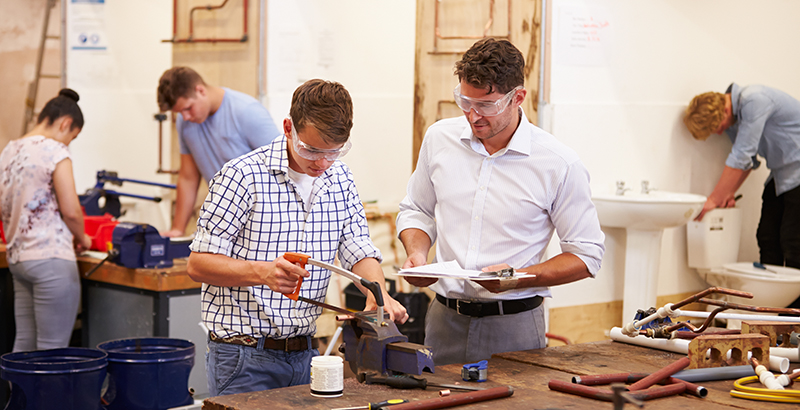Schools Should Be More Concerned With Teaching Career, Interpersonal Skills, 49th Annual PDK Poll Finds

American schools should be focusing more on preparing students for careers and the workplace and less centered purely on academics and standardized tests, so say the results of the longest-running poll of Americans’ attitudes toward public education.
Released Monday, the 49th annual PDK International Poll shows strong majorities — 82 percent of respondents — saying schools should offer job or career skills classes — even if it means less time spent on academics — and that it’s highly important for schools to help students with interpersonal skills, like teamwork and persistence.
An even larger number, 86 percent, say schools should offer certificate or license programs.
“Clearly something is missing from schools and classrooms that people want to see in those schools,” said PDK CEO Joshua Starr. “It’s missing in the policy level, it’s missing in the day-to-day experience that kids have.”
When it came to performance on standardized testing, just 42 percent see it as a highly important indicator of school quality, including the 13 percent who call test scores extremely important. The survey said every other potential metric of school quality outranked testing in the view of respondents: having extracurricular activities, art and music classes, advanced academic classes, technology and engineering classes, and developing students’ interpersonal skills.
At the same time, 66 percent of those polled say schools should be held accountable for test results as well as for academic skill results. “Even if skills are imperfectly assessed,” the poll states, “these results suggest, accountability still is in demand.”
Respondents are also supportive of wraparound services for struggling students, things like afterschool care and mental health services that educators frequently say are key to academic success. Three-quarters of those who answered the poll say schools are justified in seeking additional money to provide those services to students in need.
About a quarter, 24 percent, say they would give the country’s schools an A or B, a number that is mostly flat over the last few years. They gave higher ratings to local schools in general, with 49 percent awarding them top grades, and parents rating their own children’s schools best of all, with 71 percent awarding an A or B.
The poll for the first time asked Americans about diversity in schools, and found that while respondents think it’s important, that value only extends so far.
“People value diverse schools as long as they don’t have to work for it,” said Starr, the former schools superintendent in Montgomery County, Maryland and Stamford, Connecticut.
Slightly more than half, 55 percent, say racial or ethnic diversity in schools is extremely or very important. Black and Hispanic respondents were much more likely to say diversity is important, at 72 percent and 57 percent, respectively than white respondents, at 48 percent.
Despite that support for more diverse schools, only 25 percent of respondents say it would be worth sending their children to a more diverse school that was further away than one that was closer to home and more homogeneous.
An advisory board of education advocates picks the general topics for the annual poll, and this year thought diversity and wraparound services would be good additions, Starr said.
Continued opposition to private school choice
The PDK poll, begun in 1969, has long asked about support for voucher programs, and support has historically not been strong.
When asked “Do you favor or oppose allowing students and parents to choose a private school to attend at public expense?,” 52 percent of respondents opposed the idea and 39 percent favored it.
Support for private choice was higher among nonwhite respondents, voters age 18 to 29, and Republican or conservative voters.
Opposition to private choice rose when researchers asked further questions that said a private choice program would only cover part of tuition at private or parochial schools, or that a program could either “improve public schools by making them more competitive” or hurt them “by reducing their funding.”
But opposition on a policy level didn’t translate to opposition on an individual one: if cost and location were not a factor, 34 percent of parents would choose a public school, 31 percent a private school, 17 percent a charter and 14 percent a religious school.
Other recent polls have found greater support for private school choice programs, and support varies widely by how the question is worded.
(The 74: What Do Americans Think of School Choice? Depends on How You Ask the Question)
PDK has been criticized for the wording of that question in the past. Starr said the question is “as neutral as possible and as descriptive as possible” and said it’s important to keep the same wording year after year to get accurate trend data over time.
In this year’s EdNext poll, for instance, 55 percent of respondents supported a tax-credit scholarship program while support for charter schools dropped 12 percentage points. The poll results will be examined at a Sept. 8 conference in Washington, D.C.
(The 74: New Poll Shows Sharp Decline in Support for Public Charter Schools Over Past Year)
Support for four variations of an EdNext question on vouchers ranged from 28 percent, for universal vouchers paid for by government funds, to 43 percent just for low-income students in a question that emphasized giving families a wider choice.
Researchers for PDK International conducted the 50-state poll of 1,588 adults, in English and Spanish, via landlines and cell phones, in May. The poll has a margin of error of plus or minus 3.5 percentage points for all adults, and 5 percentage points for parents.
Get stories like these delivered straight to your inbox. Sign up for The 74 Newsletter

;)
